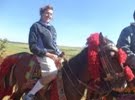Kim, Zeylelam, and Adignaw at the Assessment workshop in Addis in November, 2012.
Two colleagues from the English Department and I attended a two day workshop
in Addis Ababa hosted by the Addis Ababa English Teachers Association, headed
by AbaynehHailu. Every two weeks Abayneh organizes a professional development
workshop in Addis for English teachers from elementary to university. His
latest endeavor was to bring Dr. Cristine Coombs and her two colleagues from
Dubai. After we heard that all students in Dubai have laptops and wireless
internet, we immediately knew they were out of our league. The training was
about how to assess all areas of English language; reading, writing, speaking,
and listening. One of the most interesting parts was the writing of multiple
choice questions. We discussed the cornerstones of testing which include
usefulness, validity, reliability, practicality, washback, authenticity,
transparency, and security. We went over various types of tests, focusing
mostly on how to create a multiple choice test. I never knew how complicated it
was to create a good version of a multiple choice assessment.The presenters all
work at the university level in Dubai. Most of the assessments at university
level are considered high stakes. Zelalem, Adugnaw, and I will be responsible
for training the other English teachers in the English department at DebreMarkos
University about what we learned.
I stayed in Addis for a few days preparing for a workshop I was to give to high school students in Harar. I decided to travel east a couple days before the workshop to do some
experience sharing at Dira Dawa University and Haramaya University.
Dira Dawa was HOT. This small city in Eastern Oromia district of Ethiopia is literally a lowland bowl surrounded by scrub-dotted hills. Since there were very few trees or grass, the houses were made of stones and mud. Once I arrived in Dira Dawa, I contacted Daisy, the VSO volunteer who worked in the
English Language Improvement Center at Dira Dawa University. I met with her and her counterpart Nega. They were frustrated because after 6
years, there was still no center. The university had not yet given them a
space. They were trying to organize English clubs, classes for
secretaries, and other trainings, but none of then had come to
fruition yet.
American Corner inside the Dira Dawa Public Library Nega and Daisy in front of their office
Posters advertising ELIC in Dira Dawa

Haramaya was a different story. Gary,
the VSO volunteer who had been there for more than two years, and his
counterpart were an active pair. English Clubs ran
themselves. It had 5 officers and they had their own office. They
even had a key to the ELIC. They only had one club, which is
different than the way we organized our English Clubs in Debre
Markos. They held movie nights and showed English language films. They hosted Literature nights and Debate nights.
Gary informed me that last week there were 600 students who attended the movie that English Club organized. They charged 2 birr entrance, so the English Club can use it for whatever they want at the end of the year. The ELIC in Haramaya was most famous for its support of freshman girls, who drop out at a rate of 30% , mainly due to lack of English skills. The ELIC hired 16 graduate students to tutor 1,000 girls throughout the year in 32 hour, 8 week courses. It was an amazing feat. The tutors were responsible for organizing their own classes, leaving ELIC staff to tackle other needs on campus. They also hosted some workshops on the IELTS, which is an English Language assessment that all Masters and Doctoral candidates have to take before being admitted to Addis Ababa University.

The ELIC staf and student leaders at Haramaya University
After Haramaya I moved on to Harar to teach the
English Access Microscholarship Program students. I was preceeded by an awards ceremony for the winners of an essay writing contest hosted by the Cultural Affairs Office of the American Embassy. The Access program is aimed to high school students from poor families in various countries throughout the world. In Ethiopia, we have two Access programs running. The kids have to compete for this two year class, held every Saturday, that emphasizes English Language and American culture. I prepared a class about Veterans Day, which included clips of songs from World War Two (for those of you old enough to remember the Andrew Sisters) and the Vietnam War Era (Country Joe and the Fish at Woodstock, protests against the war). I showed them a Veterans Day Parade, several memorial monuments in Washington DC, and clips from Born on the Fourth of July. I wanted the students to see the contrast in feelings that American citizens and veterans alike had in the U.S. concerning service in the military. They were a shy bunch in my presence and didn't practice their oral English as much as I wanted them to. This is a common occurance for me in Ethiopia. Since I am a native speaker, many people are afraid to speak with me, thinking I may judge their mistakes. Emphasizing descriptive adjectives throughout the class, the students were assigned to write a poem about an imaginary soldier using an adjective list to help them.

Obsa reading his essay
Top: Molly and Tahra from the American Embassy with the winners of the essay contest;
Two of the female winners with their prizes;
37 of the 42 Access students in Harar











































